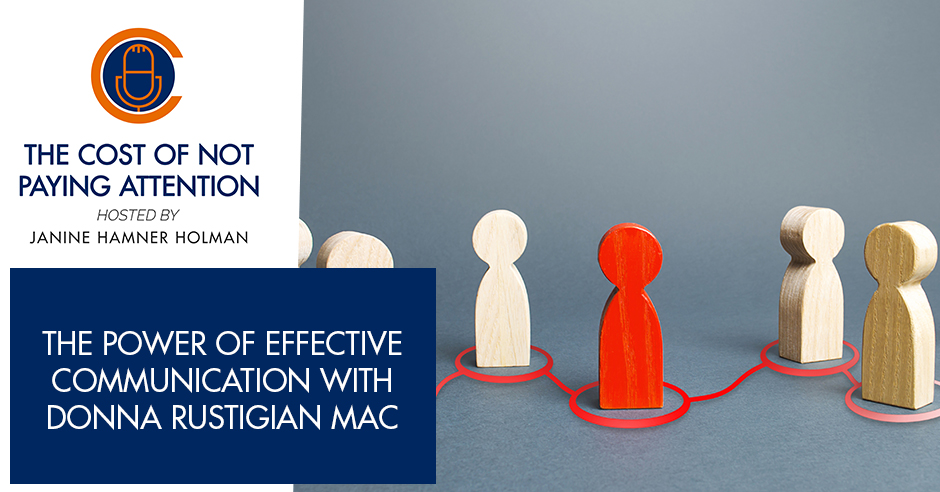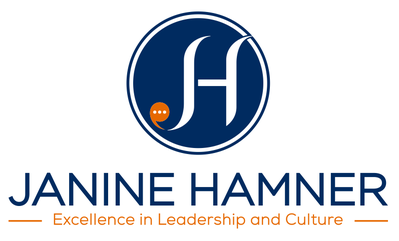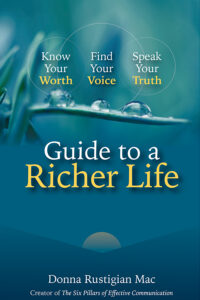
Speaking and listening are the most underrated accomplishment tools in business and relationships. Merely relaying your message to the opposite person is not effective communication at all. We need to understand the deep wonders of competent communication to better impart our thought to the receiving person. In this episode, Donna Rustigian Mac, educational keynote speaker and author of Guide to a Richer Life, shares insightful thoughts to empower you with skillful life techniques and maximize the benefits of effective communication. Hop in and learn to create a healthy human connection with the right words and conversations.
HOST: Janine Hamner Holman | [email protected] | LinkedIn, Facebook, and Twitter | Subscribe to my Newsletter! Book me to Speak!
—
Listen to the podcast here:
The Power Of Effective Communication With Donna Rustigian Mac
What am I paying attention to? The power of imposter syndrome. Imposter syndrome is that niggling fear that maybe we can’t do that thing that we told somebody we could do. I was on a Zoom with a whole group of CEOs and thought leaders and this topic came up. One person asked, “How often do you feel like you’re faking expertise?” I thought that was brilliant. The reality is that we all have that voice in our head that says, “You can do that thing. You’re awesome at it,” but maybe you’re not. It’s not helpful for all of the things that we’re up to. It’s one of those things that I would love for us to stop paying attention to. It’s pretty hooky. It gets its hooks in us.
I’m going to be talking in the future and probably blogging as well about the cost and the power of imposter syndrome, which leads me right into our next guest. This gal, she isn’t an imposter. She is hot. Her name is Donna Rustigian Mac. We’ve known each other only for a couple of months. Do you know how you meet those people and you think, “I like you. I want to get connected with you. I want to be friends with you?”
We might have known each other in a past life.
We might have. It’s entirely possible. I’ve always wondered about those connections when you meet and you’re immediately talking about the real stuff. That’s who Donna Rustigian Mac is for me. She is the Founder and President of iVoice Communication, which is a company that trains current and emerging leaders to be seen, heard and be more influential through effective communication. While she looks like she’s a teenager, she has decades of experience and was a female pioneer in the media and digital media space.
She’s also a certified Mindfulness Teacher and the author of Guide to a Richer Life: Know Your Worth, Find Your Voice, Speak Your Truth. Donna’s mission is to create a world where everyone has the confidence and ability to communicate so that they can form healthy human connections and live a richer life, personally and professionally. She’s also a resident of Metropolitan Boston, which I especially love because I grew up across the river from Boston in Cambridge. Welcome, Donna.
It’s my absolute pleasure to be here, Janine. Thank you.
You’re welcome. Let’s hop into it. As our readers know, our show is called The Cost of Not Paying Attention. What’s something that you have become aware of that either you or other people weren’t paying attention to before? What was the cost of that not paying attention?
Janine, where the heck do we start? According to the Mindfulness Center at Brown University in Providence, Rhode Island where I’ve been doing some studying, they say 48% of the time but nearly half of our time we are not present. We are either thinking about something that happened in the past or thinking about something that may or may not come up in the future. We are not present. Isn’t that amazing?
It is amazing and it’s not surprising. I have on my computer a post-it note that says, “BE HERE NOW,” to help me remember to stay present. It’s easy to get pulled out because our brain is constantly going in all different directions and different ways. We get distracted super easily. We’re all in this time of COVID where many of us are working from home and it’s easy to get distracted. One of the things that I talk about is listening and the power of listening in communication and all the things that we are doing when we think we’re listening but we’re not.
Don’t listen to that voice in your head that tells you that you can do that thing but you are unable to. Share on XI’m going to guess that you teach listening skills. That’s part of your repertoire, part of your menu so to speak. I do the same. I’ll tell you a quick story. Luckily, the story happened a few years ago. I was teaching an emerging leader some listening skills and the importance of being there and being present with her new employees. She had gotten hired into this particular position. Our coaching session was 2.5 hours long. Halfway through, we both took a break. We came back and we started talking again. During the break, what did I do? I probably hit the restroom, checked my email, checked my texts. The break lasted maybe eight minutes. When I came back, I’m thinking about the emails and the texts. All of a sudden, she’s talking and I realized, “Your executive communication coach isn’t listening.” Guess what I did?
What did you do?
What do you think?
You told on yourself.
I called myself out. I had to. I could have gotten away with it. You try to be as high integrity as possible. It was a good story when you think about it. I’ve told that story to other people and they get it, they understand. The skill here is to be aware when you find yourself not listening and to call yourself out.
I love that idea of leaders. You’re in the position of being the coach. You are the one who’s leading this conversation. You are willing to be transparent, to be open, to be that word that we often have a love-hate relationship with, vulnerable, and to call yourself out and to say, “I’m realizing I went away. I realized physically I was here, but my brain was doing other things.”

Effective Communication: We are either thinking about something in the past or something that may or may not come up in the future.
It is vulnerable. At the same time, it needs to be honest. If you are going to move forth as somebody trustworthy, what is more important in the world, personally and professionally, as we move forth doing our best to develop trusted relationships? It has to start from within. It can’t start with fibs. It has to start with thorough honesty, first and foremost with yourself and then with others. That’s what I do my best. That’s what I stand for.
Another study I wanted to cite on this show is our attention spans. I read an article that said, “Our attention spans used to be twelve seconds long.” We could focus on something for twelve seconds before our brains were distracted by something. However, that has decreased from 12 to 8. Eight seconds is less than the attention span of a goldfish. There’s more, this article was written by the folks from Microsoft in the year 2015. Can you imagine our attention spans now? You mentioned COVID. Stress makes a difference. It’s hindering us. We’re concerned about what’s going to happen in our futures. It’s easy to stay, I call it, in the OODA loop, in your mind and be distracted. Understanding the attention span and understanding the detriments of being distracted and not paying attention is important.
I know that when you talk with folks about communication, there are some key pillars, key guide stones that you use. Could you tell us some more about that?
In the year 2012, I created something called The Six Pillars of Effective Communication. Somebody asked me, “Where did they come from?” I said, “It was a download.” I was preparing to do a talk because I do quite a bit of public speaking. Somebody asked me to speak on the topic of fear, especially around the fear of not only delivering complex presentations but especially around the fear of having those crucial conversations with people. I sat down and I started writing. I’ll go through them quickly for you. I’m going to start from the end. Pillar number six is called Detach From the Outcome. You get it though, don’t you?
Show integrity. Be aware when you find yourself not listening or distracted and call yourself out. Share on XI love it that’s the last one. I love that’s where you started. That’s ninja level, being able to detach from the outcome. That’s some serious Buddhism going on right there. I know some of what you’re talking about. I’m sure you know way more than I know about the opportunity to detach from the outcome. Tell us more about that.
It’s a hard job. You don’t always get it right. We’re attached. We want positive outcomes. Let’s say you’re having a conversation and you’re presenting a proposal to someone. You want them to buy from you. You want them to know, like and trust you, and sign on the dotted line at the end of the conversation. Think about it. If you are attached to the outcome, you want them to buy. You want them to trust you, like you. They feel that. When you move forth as someone who’s more detached, you trust yourself. There’s that trust word again.
You want them to trust you. First and foremost, you trust yourself. If they’re not supposed to sign on the dotted line and work with you at this time, it’s okay. It might not be the right time. Perhaps you were here to plant some seeds. Maybe there are a couple of things in your proposal, which can be enhanced, which you can perfect over time as you learn and as you continue to grow as a leader. That’s one way of looking at detached.
The other way of looking at detached is, “I have to, without a doubt, have this conversation with this person. Even if I know they are completely not going to be on board, I still have to say the words.” This is reminding me of a straight spine. How’s your backbone doing? You’re able to go in and have that conversation that needs to be had. Most people, when they’re speaking and doing their best to connect with other humans whether it be one human, one challenging personality, or a large group of people, our brains talk about not paying attention. Our brains think about it. We’re up there. We’re speaking. We’re trying to be influential, but our brains sabotage us by being distracted with thoughts such as, number one, “What are they thinking about me? How am I being perceived?” Number two, “Am I being perfect?” I always remind folks, do your best to detach from those things.
Number one, there’s no such thing as perfection when it comes to effective communication. Number two, if you’re in there having an opportunity or with an opportunity to have an important conversation with them, you’ve already thought about the person. You’ve already thought about the audience. You shouldn’t be thinking about it for the first time here. When you’re detached, you feel calm, confident, and more comfortable in your own skin. That’s important because how you feel as a communicator is directly related with how others in the room feel. That’s why I start with detach from the outcome.
Pillar number one is Know and Own and Be Who You are. I have a whole program around that. At the end of the day, you want to be authentic, you want to be you and you want to be approachable. Those are the two biggest things, authentic and approachable. Pillar number two is Relate With Them. Once you spend all this time doing your best to understand who you are, remember, it’s not about you. It’s about them. If you take time to make it more about your people, more about the people you’re communicating with, they’ll feel that and they’ll appreciate that.

Effective Communication: Detach from the outcome. Convince yourself to detach from the thought of you being perfect.
Pillar number three is called Master Your Content. Do your best to know what the heck it is you’re talking about and structure it in a way. You make it not only easy for you, but you make it easy for them to understand. We’re going to talk about the three most important topics surrounding the program that we’re working on. Also, be aware of something I call industry jargon. It’s easy to talk about industry jargon because you’re a thought leader. You’re a smart person. It’s not about you, it’s about them. Be aware of industry jargon. Make it easy for folks to understand and digest your information.
Pillar number four is called Anticipate Questions and Reactions. What are they going to be concerned about? What are they going to be curious about? At the same time, how are you going to be reacting when you get to a particular point in your presentation or a particular point in your conversation? Think about these things before going in. That’s important. Pillar number five is called Serve When You Speak because we’ve all heard of speakers who speak. It’s like, “Here’s the information. Here’s more information. I can give you even more information.” Serve when you speak and do your best to make sure you make it more about them instead of about you. I also equate this pillar with doing your best to move forth as somebody who is educating, somebody who is in teacher mode. You’re also doing your best to ensure that understanding is taking place.
In this particular pillar, when you speak, you are attuned to the listener, which is not an easy place to be. That’s why it’s important to master your content, pillar number three, and to practice a bit so it comes much more easily and naturally to you and you can serve when you speak. You’re not only focusing, paying attention to what you’re saying, you’re also paying attention to them. It’s not an easy job. It takes practice. To get to pillar number six, detach from the outcome where you’re calm and confident or more confident than you normally would be, you have to work through pillars number 1 through 5. It’s a practice. You don’t get this stuff overnight, even your executive communication coach. Coach forgets from time to time. It’s a practice. It takes time for it to become part of you, who you are and how you communicate with others.
I love the combination of looking inward and looking outward. Much of where we as people get tripped up is our idea about communication is all about what’s coming out of my mouth and little about what’s landing over there. When you combine that reality, I’m too focused on what I’m saying and not enough focus on what you’re receiving and the fact that our attention span is shorter than a goldfish. There’s so much opportunity for us to get too into our heads. For those of us who feel called to help organizations and help individuals step into their leadership more, help transform the world of work so that it’s one in which everyone can thrive. It’s my personal mission statement.
The best way to develop trusted relationships is to start with thorough honesty, first and foremost with yourself and then with others. Share on XWhether it’s helping leaders be their best for their people, whether it’s transforming internal organizational cultures so that everybody can bring their full selves to work, whatever our particular flavor of that mission is, we can get wrapped up in, “I have information that is important in my mind that I am going to flood you with it.” Instead of figuring out, “What are the bite-sized pieces that we can start with and layer in so that you can stay present so that you can listen so that you can consume the information in a way where it’s landing for you?” That’s part of what is great in how you’ve constructed these pillars. Each one is a bite-sized concept that moves from understanding what’s happening with me to understanding what’s happening with you to then create the connection between me and you and then be unattached to the outcome.
Easier said than done. You’re right about the inward and the outward. That is what differentiates me from a lot of other executive communication coaches, Janine. In addition to 40 years in the world of communication and for the last twelve years as an executive communication coach and a workforce trainer, I’m also a certified mindfulness teacher. Sometimes when I say this, people look at me like I have three heads.
People are starting to understand the importance of that personal piece and the introspection and understanding who you are as a communicator, hence, pillar number one, know and own and be who you are. Spend a lot of time there. I spend time every day asking myself the question, what worked? What didn’t work? How can I make it a little bit better tomorrow? It’s hard to figure out who you are as a communicator. What are my strengths? What are my vulnerabilities? I never call them weaknesses because we all have strengths. we all have vulnerabilities.
It’s challenging to understand who you are as a communicator and even more challenging to try to understand the other person, the other guy. If you can’t totally and completely understand who you are, how on earth are you going to understand the other person? All you can do is do your best to understand human dynamics. That’s what I take people through with pillar number one, helping them understand human dynamics. This is part of emotional intelligence. It’s a reflection of who you are as a communicator. Giving yourself a self-assessment, self-reflection, and then turning and looking at the other person or the audience and doing your best to relate and as trusted away as possible. It is not easy work. It’s worth the time, energy, and effort to know who you are and to understand human dynamics and be okay and more than okay when people are different.
I love that you brought that up. As you know, I’m a certified emotional intelligence practitioner. I love getting into the world of emotional intelligence. COVID and the conversation that many of us got propelled into around diversity, equity, inclusion, systemic racism and the whole idea of embracing diversity. One of the things that I do is work on diversity, equity, and inclusion with organizations that are interested in taking that on and not just checking a box. We did an implicit bias training and we’re done.
Those that understand when we are diverse, when we have different experiences, perspectives and worldviews, we, as a group, make much better decisions. We’re more agile as organizations. We’re more profitable as organizations. It makes everything better. There are real challenges that we need to address to do it well, to do it thoughtfully and mindfully, and to not prod over other people. Have an opportunity to be self-reflective and to embrace all that it is that we are as human beings, both the awesome and the less than awesome in us. I love that you brought in this idea around embracing our differences. I know that part of what you do and as part of what I do is help people with challenging, crucial and difficult conversations, however, you want to put the frame.

Effective Communication: Master your content. Do your best to know what you’re talking about and avoid industry jargon.
I’m working with an organization that has two members of their management team that cannot get along. After two and a half years and losing some staff, they finally decided that they should do something about this. We’re getting going on that. It’s a lot of fun. It’s super challenging. Of course, I can’t get them to do anything. They get to, themselves, learn some new tools, give up some stuff, move into some stuff and create a new way of being. Thankfully, we’re also doing it with the CEO of the company. We’re all in the soup together.
Can I help you a little bit with that one?
Yes, please. I’m glad I’m bringing it up.
You might have already done some of this. The first thing I do when I’m dealing with people who are in conflict is you speak to each one individually and you get a sense of who’s open to learning and growing and seeing their blind spots because some people do not. They’re not open to seeing their blind spots or they say they are but they aren’t.
For those people who might be reading who don’t know what a blind spot is, what’s a blind spot, Donna?
“You have something in your teeth.” “No, I don’t.” I have a program called The Grace 360s where each individual on a leadership team gets to choose three people that they trust will be honest with me about that person’s strengths and vulnerabilities. I get on the phone with them. Tell me where they’re great and then tell me how we can help them be better. I’ve heard many different things. There was one CEO I was working with and the three people he chose said, “He needs to realize that he tries to walk amongst the people.” He thinks, “I’ll walk amongst the people.” He’ll occasionally ask the little people questions, but he’s not listening. He’ll attend the meetings but then, all of a sudden, he’ll get on his phone. He’s not paying attention to the meeting. That’s one thing.
I was working with a young woman and one of her blind spots was she was too nice. A brilliant woman and likable but a people pleaser. She would delegate to people and they would drop the ball on her. Why? Because they could. People naturally are procrastinators. They’re like, “We’ll do all of the other work. We’ll put her last on the list of things to do. If we get to it, we get to it. If we don’t, we don’t.” Between some group training and some one-on-one coaching, she was able to learn how to delegate with what we call mindful authority. I reminded her that you can still be kind and authoritative.
It's worth the time, energy, and effort to know who you are and to understand human dynamics that people are different. Share on XI wrote a piece called Kind Not Nice.
She could deliver it kindly but stand in her power simultaneously. They knew she meant business. She needed this. I’m proud of her. It took her time. It took her practice because she had to step out of her comfort zone. She grew as a leader. It was interesting because she told me the person that she delegated to who consistently had dropped the ball in the past, she said that they grew as well because they were proud of themselves when they were able to meet the deadline the last time around. It was a cool project. They had to scramble the last couple of days but they did it and they did it on time. Think about it, it was a win-win-win, a win for her, a win for them, and a win for the company.
Right there, I always point, there’s a direct connection between that right there and the bottom line. She didn’t have to waste any time. She didn’t have to call up the client and say, “We’re going to be another week late. We’re going to be three days late.” She had a little stress because she had to learn new skills and practice new skills but once she did, she’s super proud of herself. She is empowered and she can empower others.
One of the values of my company is empowerment, empowering ourselves, empowering our clients, empowering their teams. I love the whole concept of empowerment.
As long as the CEO and the senior leaders are on board. Sometimes they’re afraid to empower the people. We’re not living in an old-fashioned manufacturing society anymore. It’s a knowledge economy. It’s a new way of moving forth and doing things. We need our people and now is the time to do it because many people are in leadership positions who are going to be retiring over the nice X amount of time. There simply aren’t enough people in that mid-generation and Generation X to fill the positions that are going to be vacated over the next 5 to 10 years. You do need to groom that next generation of employees. A lot of times, the senior leaders can’t groom the next generation of employees because they weren’t trained. They don’t have the skills.
It’s an opportunity and a challenge. Donna, if you had a magic wand and you could have people pay attention to one thing, either something that we were talking about or something else, what would that one thing be and why?

Effective Communication: Serve when you speak. Do your best to ensure that understanding is taking place during communications.
I would have people pay attention to who they are as opposed to who they aren’t. It’s interesting because you started this podcast, Janine, with the story about imposter syndrome and our negative brains. Our brains automatically default to the negative. It’s easy for us to see who we aren’t as opposed to who we are. That’s why I created something called the Appreciation Journal #YayMe for people who have difficulty in this area. It’s like a gratitude journal. Write down 1 or 2 things a day that you appreciate yourself for and replenish that within yourself. This way, you’ll be able to see it within yourself.
Here’s the cool thing, once you get good at seeing who you are instead of who you aren’t, you’re much more apt to be able to see who others are as opposed to who they aren’t. That is directly related to diversity and inclusion and all the biases that are running rampant. It’s work. Notice it and do your best to push those what I call the negative committee members. Sometimes I call them the freaking nitpickers. Tell those nitpickers, “Thank you for your service but go sit in the corner for a while. I’m busy.” I got it. I trust myself. You’ll be able to open the door and you’ll be able to build more trusted relationships.
That’s a perfect note to close on. Thank you so much, Donna Rustigian Mac. This has been a wonderful conversation.
It has. Thank you so much, Janine. It has been awesome. It is wonderful to meet a kindred spirit who cares about humans and human development, especially in the workplace. We spend more of our waking hours in the workplace than anyplace else, even if the workplace in this day and age is the same place you live. It’s not going to be forever. We’re doing good work. I feel blessed and I know you do too.
Remember, great leaders make great teams. Until next time.
Important Links:
- iVoice Communication
- Guide to a Richer Life: Know Your Worth, Find Your Voice, Speak Your Truth
- The Six Pillars of Effective Communication
- The Appreciation Journal #YayMe
About Donna Rustigian Mac
 Donna Rustigian Mac helps current and emerging leaders create healthy human connections through effective communication–both complex presentations, and crucial conversations. Donna provides the confidence and the skills so people can be seen, heard and more influential.
Donna Rustigian Mac helps current and emerging leaders create healthy human connections through effective communication–both complex presentations, and crucial conversations. Donna provides the confidence and the skills so people can be seen, heard and more influential.
In addition to 4 decades in the communication industry, Donna is a certified mindfulness teacher who studies Behavioral Change at the Mindfulness Center at Brown University. Donna is also an executive communication coach, workforce trainer, and motivational speaker. She was a pioneering female in the media and digital media and is the Founder and President of iVoice Communication, a company dedicated to creating Healthy Human Business Connections through high-level effective communication.
Donna’s undergraduate degree is in Liberal Arts and Humanities. She’s also studied Social and Organizational Psychology at Lesley University, and Mindful Habit Change with Tara and Daniel Goleman, (authors of Emotional Alchemy and Emotional Intelligence). From 2003-2009, she partnered with Clear Channel Communications as host of Vital Women Radio, profiling more than 100 famous and accomplished females.
Donna is the author of Guide to a Richer Life, Know Your Worth, Find Your Voice and Speak Your Truth. She also created the Appreciation #YayMe Journal as well as The Six Pillars of Effective Communication.
Donna lives in Greater Boston, Massachusetts, USA, is an avid runner, skier, gardener, and the mother of two kind, strong and successful millennial females, an introvert and an extrovert, who has the great ability to communicate!





